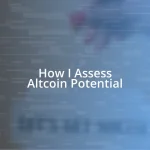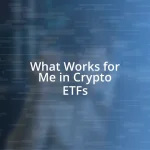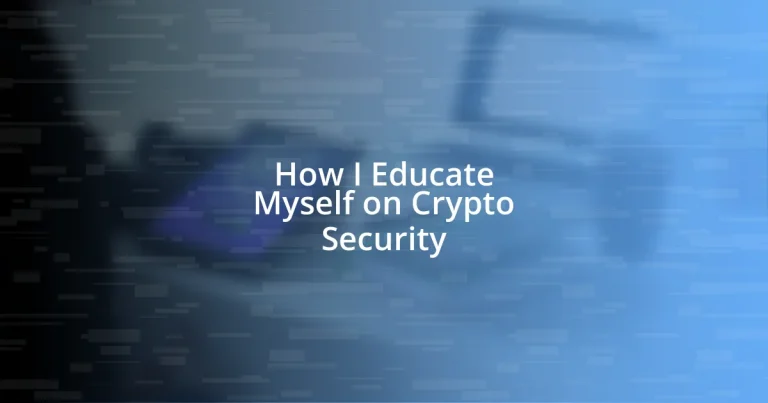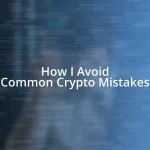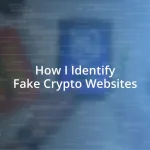Key takeaways:
- Understanding the importance of private keys and using hardware wallets significantly enhances crypto asset security.
- Identifying major security threats, such as phishing attacks and malware, is crucial for safeguarding digital assets.
- Continuous learning through reliable resources, community engagement, and real-time workshops helps stay updated on evolving crypto security practices.
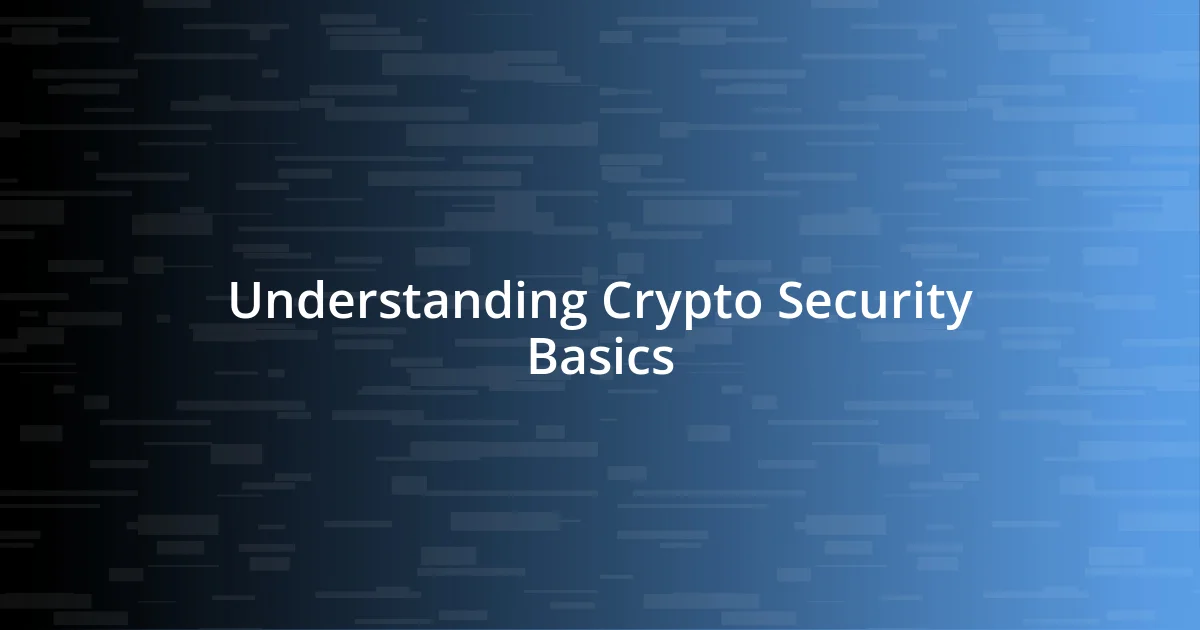
Understanding Crypto Security Basics
Understanding the basics of crypto security is crucial for anyone venturing into this digital realm. I remember the first time I bought cryptocurrency; the amount of information out there was overwhelming. I often found myself asking, “How do I keep my assets safe from potential threats?”
One pivotal lesson I learned was the importance of private keys. When I first started, I didn’t grasp that these keys are my digital identity; losing them could mean losing access to my crypto forever. Now, I treat them like a top-secret password, ensuring they are stored securely offline.
Another fundamental aspect that I always emphasize is the use of hardware wallets. The peace of mind I felt after moving my assets from an exchange to a hardware wallet was palpable. It made me realize just how vulnerable I was before; it’s like having a safe in my home instead of leaving my valuables out in the open. There’s no question that the myriad of security measures can feel daunting, but understanding these basics has been an empowering journey for me.
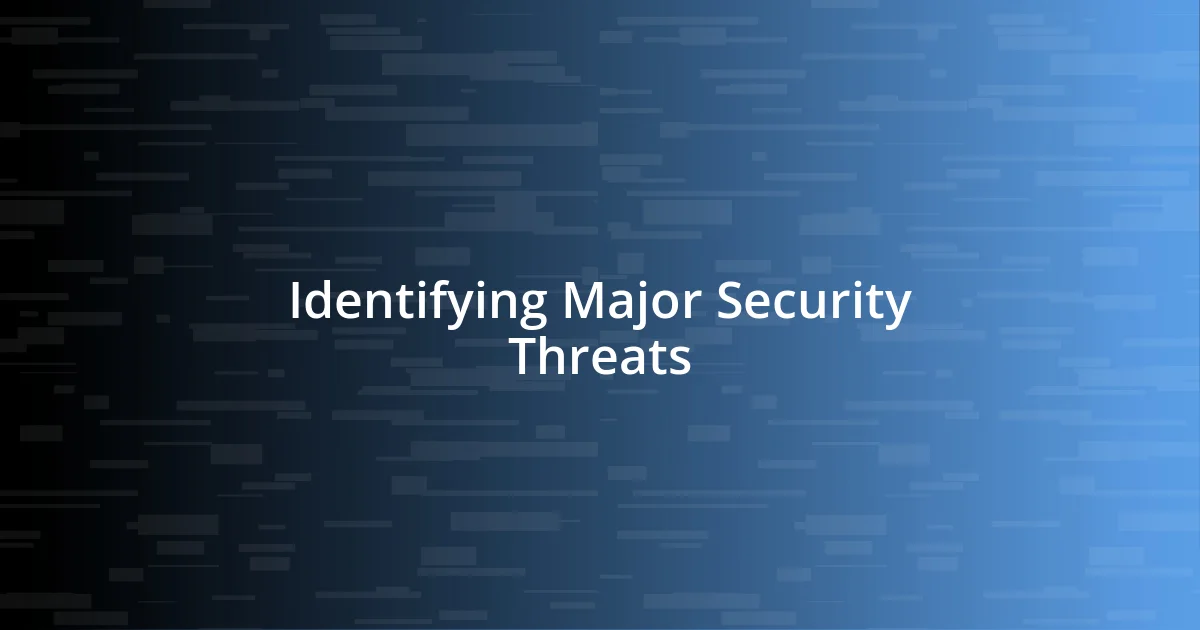
Identifying Major Security Threats
Identifying major security threats in the crypto space is an essential skill that I’ve developed through experience and ongoing research. It amazes me how many users overlook potential vulnerabilities, often underestimating the cunning tactics employed by attackers. I remember receiving a phishing email that appeared to come from an exchange I used; thankfully, I spotted the odd email address before clicking any links, but it was a stark reminder of how easily one can fall victim to such traps.
Here are some of the major security threats to look out for:
- Phishing Attacks: Deceptive emails or websites masquerading as legitimate services to steal personal information.
- Malware: Software designed to infiltrate your device, often used to access wallets or steal private keys.
- Social Engineering: Techniques used by attackers to manipulate individuals into revealing sensitive information unwittingly.
- Exchange Hacks: Security breaches in cryptocurrency exchanges where attackers gain unauthorized access to user accounts.
- Rug Pulls: A form of fraud in decentralized finance (DeFi) where developers withdraw funds from a project, leaving investors with worthless tokens.
By continually educating myself on these threats, I’ve become more adept at recognizing potential dangers, ultimately safeguarding my digital assets more effectively.

Choosing Reliable Educational Resources
Choosing reliable educational resources is a vital step in mastering crypto security. Over the years, I’ve discovered that not all sources are created equal. When I first dived into this subject, I often trusted flashy online guides that promised quick fixes. One day, I found an article that led me to a scam site—I had to reassure myself that becoming discerning would save me from more significant headaches in the future.
It’s essential to look for resources backed by credible experts or established organizations. I now prefer following industry leaders on social media and subscribing to reputable newsletters. I remember a time when I followed an account without doing my due diligence. Their misleading advice cost me not just time but also affected the security of my initial investments. Now, I ensure that the content I consume aligns with the most current and trusted information.
To streamline my search, I started comparing different educational platforms. I look for those that offer not only articles and blogs but also forums and online courses. This multifaceted approach allows me to dive deep into specific topics and learn from diverse perspectives. Just last week, I enrolled in a workshop that provided me with actionable skills. Engaging with fellow participants and instructors enhanced my understanding tremendously.
| Resource Type | Trust Level |
|---|---|
| Medium Articles | Medium |
| YouTube Tutorials | Variable |
| Official Crypto Websites | High |
| Social Media Influencers | Variable |
| Online Courses | High |
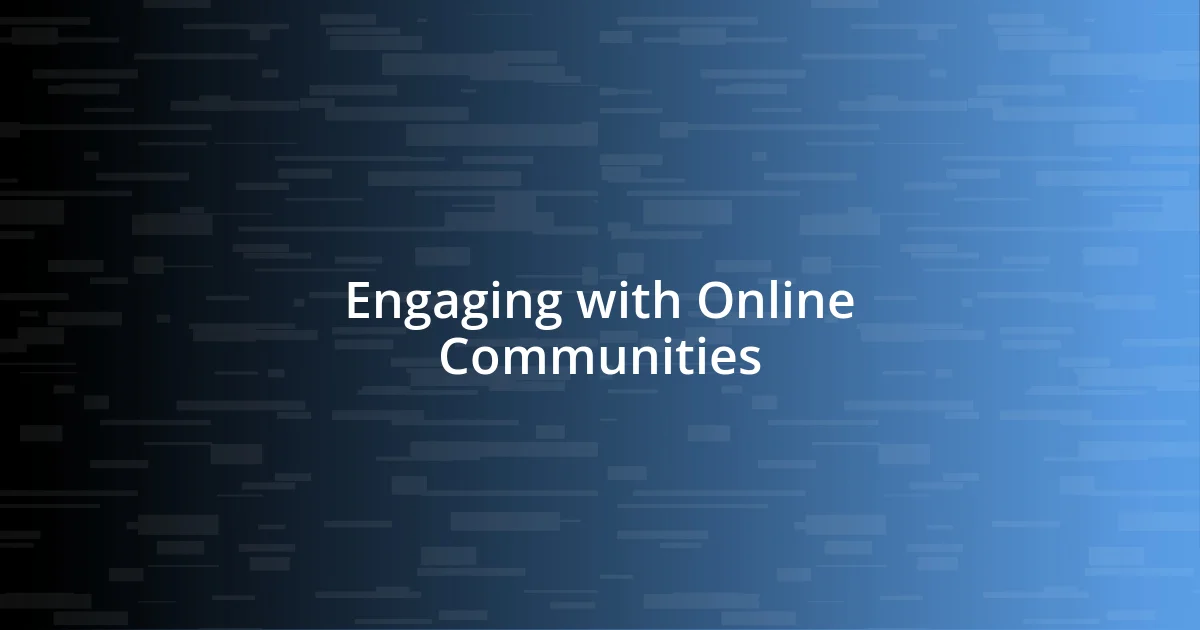
Engaging with Online Communities
Engaging with online communities has been a transformative part of my journey in understanding crypto security. Platforms like Reddit and Discord are treasure troves of knowledge where users share their real-life experiences and advice. I recall a late-night discussion in a Discord server where someone shared a near-miss with a fraudulent investment. The collective insights that followed not only educated me but also instilled a sense of camaraderie among us—like we were a team combating a common threat.
As I participated more actively, I started to realize how teamwork can amplify our learning. I’ve posted questions about security practices and often received responses from seasoned veterans in the field. In one instance, someone guided me through the intricacies of setting up two-factor authentication—it felt like a light bulb moment. It made me wonder, how many others might benefit from these shared experiences if they took the leap to join a community?
The emotional connections forged in these spaces can’t be overstated either. When reading stories of others who faced similar challenges, I often felt less alone in my concerns about security. There’s a powerful realization that we’re all in this together, and it motivates me to contribute my knowledge and experiences. This engagement not only boosts my confidence but also reinforces the importance of sharing information to protect not just ourselves, but the community as a whole.
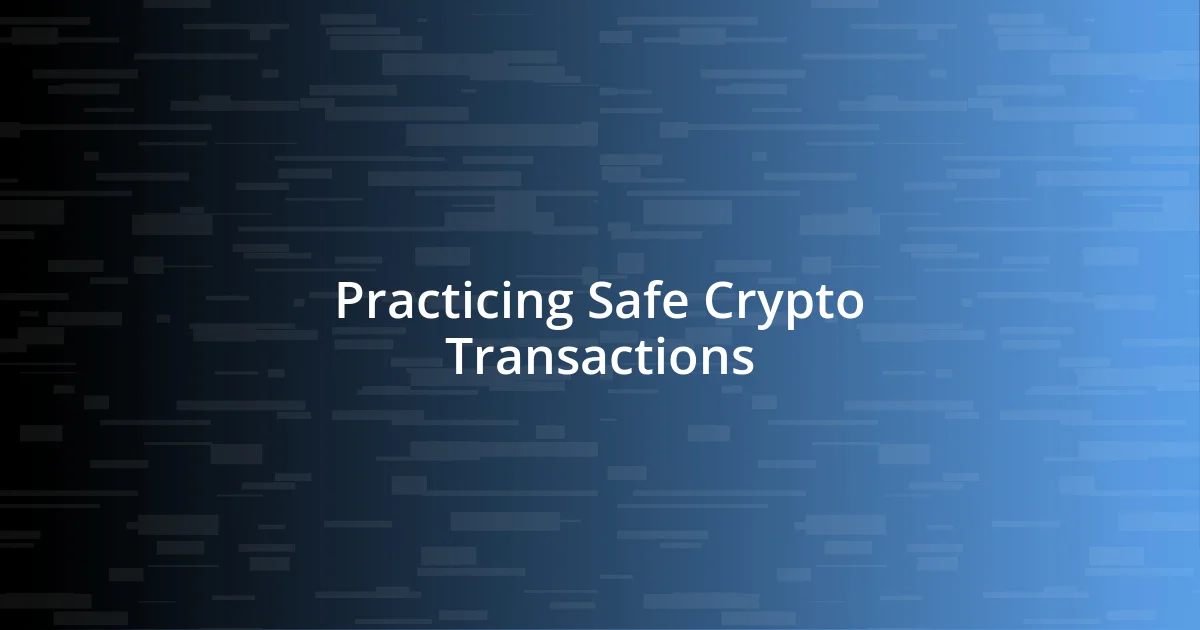
Practicing Safe Crypto Transactions
Practicing safe crypto transactions is crucial in this ever-evolving digital landscape. I learned early on the importance of double-checking wallet addresses before sending any coins. I still remember the sinking feeling I had when I mistakenly copied an address from a phishing email instead of the legitimate one—it was a hard lesson that I’ll never forget. Now, I make it a point to use QR codes whenever possible to eliminate that human error.
Moreover, I’ve found that using a hardware wallet significantly enhances my peace of mind. These devices store my keys offline, making them less susceptible to hacks. Just a few months ago, my friend was targeted in a phishing attack, and it drove home the message of safeguarding my investments. I can’t help but question—how many people would still be holding their crypto if they had taken preventive measures like these?
Lastly, I always ensure that my software and devices are up-to-date with the latest security patches. I’ve experienced firsthand the impact of outdated applications when a simple oversight put my crypto at risk. It’s a reminder that in a world where technology changes rapidly, staying diligent is key. How about you? Are you doing everything possible to protect your investments?
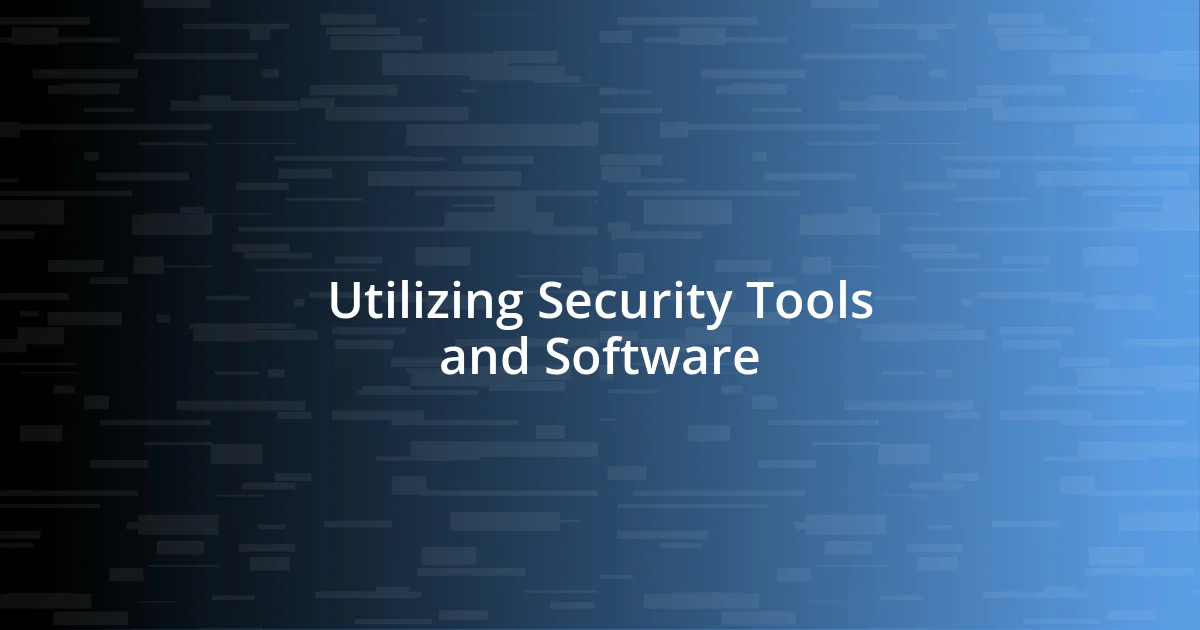
Utilizing Security Tools and Software
Utilizing security tools and software is a fundamental aspect of my approach to safeguarding my crypto assets. I’ve experimented with various password managers, which not only store my complex passwords securely but also generate them. The first time I used one, I felt like I had unlocked a whole new level of complexity that I could never have memorized, allowing me to create unique passwords for every account. Isn’t it reassuring to know that a tool is standing guard over your sensitive information?
Another invaluable resource has been the use of VPNs while accessing my wallet or trading platforms. I remember a time I was at a coffee shop, and I hesitated before logging in since the network seemed sketchy. Installing a VPN turned that challenge into a non-issue as it encrypted my data, making it incredibly difficult for someone to snoop. Have you ever stopped to think about how easy it is for hackers to intercept your connection in public spaces?
Additionally, I’ve started leveraging security alerts and notifications from my exchange platforms. The moment I receive an alert about unusual login attempts or transactions, it sends a jolt of urgency through me, reminding me to act quickly. That sense of immediate feedback has made me more proactive, and I often wonder how many people overlook this simple yet effective preventive measure. Ultimately, these tools empower me in my security journey, and I believe they can do the same for anyone willing to invest a bit of time in their crypto education.
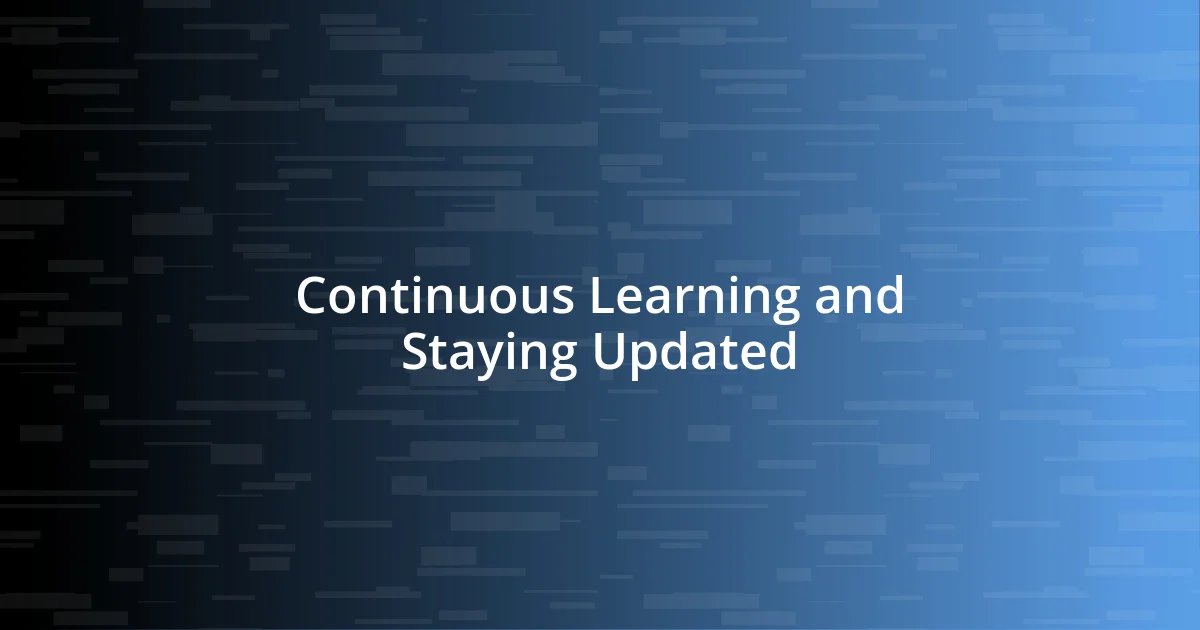
Continuous Learning and Staying Updated
Staying updated on crypto security is a continuous journey that requires my attention and dedication. I regularly dive into forums, podcasts, and newsletters focused on cryptocurrency, savoring the insights shared by experts and enthusiasts alike. After discovering a pivotal podcast episode on advanced phishing techniques, I felt a renewed urgency to reevaluate my own security measures—it’s fascinating how much there is to learn, isn’t it?
One practice that has served me well is joining online communities where discussions about security trends are lively and frequent. Just a few weeks ago, I participated in a live chat where someone shared their experience with a new type of malware targeting crypto wallets. I felt a bit of anxiety wash over me, but it also reinforced the need to remain networked with like-minded individuals. Have you ever found yourself in a situation where learning from others’ mistakes helped you avoid a serious blunder?
I’ve also made it a point to attend webinars and workshops focused on crypto safety. The excitement of learning new strategies in real-time invigorates my understanding of the ever-shifting landscape. Just last month, I attended a workshop where an expert demonstrated how to set up multi-signature wallets effectively. The information not only thrilled me but prompted a significant shift in how I manage my assets. Isn’t it empowering to think that every new lesson learned could further shield us from potential threats?






